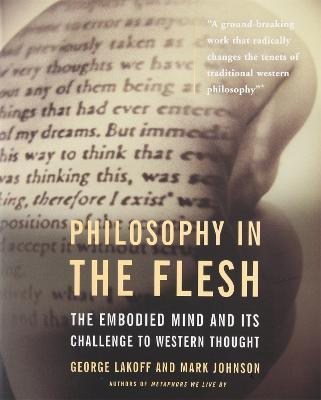“There are two major contemporary philosophical traditions,” my professor told the class on our first day of a survey of contemporary philosophy course, the third such survey course required for the degree. “You have analytic philosophy and continental philosophy. If you were studying in Europe, you’d be studying continental philosophy at this point. But in the US and England, we follow the analytic track instead.”
Not an exact quote, but the gist of it. That class was a slog, not through any fault of the professor’s but because the material was deeply frustrating and not the kind of thing any starry-eyed teenager is excited about when declaring their major. Boo on analytic philosophy, in other words. What a surprise, then, that Lakoff and Johnson have a whole chapter in Philosophy in the Flesh dedicated to dunking on on it!
I was originally interested in the book for entirely different reasons, however. Somehow or other I’d been pointed in the direction of Lakoff and Johnson’s earlier book, Metaphors We Live By, and I loved it and wanted a deeper dive into the topic. Philosophy in the Flesh is just that: a comprehensive look at the mechanics of brain studies carried out to investigate their points, a summary of the larger organizing metaphors in English, “primary metaphors” to use their terminology, and an examination of some of Western Philosophy’s Greatest Hits through the lens of these metaphors. All of this is in support of their thesis that the human mind (and other minds as well) arise from being embodied, and that sensory input from existing and moving in the world fundamentally shapes our thinking, even for the most abstract discussions. They claim that the idea that we can use a purely disembodied reason completely abstracted away from physical experience and the body, à la Cartesian dualism, is at odds with the evidence we now have about how the brain works. A section-by-section summary is available through the archives of the NYT. The claim seems pretty well argued to me, though I am a mere layperson unqualified to fight in the Linguistics Wars. I only have two disappointments/criticisms, and they pertain more to the presentation rather than to the actual content.
The first is that I felt like the level of universality they were ascribing to their primary metaphors was unclear. While Lakoff and Johnson emphasized that the metaphors they were proposing were not all necessarily universal across languages or cultures, they didn’t provide enough details about exceptions or variations from these primary metaphors to really drive the point home. More comparison between two distinct, relatively unrelated languages/cultures would have been helpful, for example English and Navajo.
The other was the near-complete lack of attention given to AI. Lakoff and Johnson aren’t the first to tackle the mind-body problem—it’s a tale as old as time and all that—but the cognitive science they bring to bear, thanks to new studies we can carry out regarding human cognition, is above and beyond the usual hot takes on Cogito ergo sum and sets the ground for some potentially formidable criticism of strong AI. (Related reading: Nicholas Humphrey’s A History of the Mind.) But Philosophy in the Flesh came out in 1999 and in a very different technological context. The concerns we had about AI were pretty well summed up in The Matrix; we had no DALL-E, no ChatGPT, no LaMDA, and we were still over a decade away from automatically generated sports journalism. The discussion of embodied minds seems more relevant than ever now, so reading this book in 2023 is a bit frustrating in that regard. The points that Lakoff and Johnson raise have a lot of juicy implications for people working with AI, and for anyone in jobs that might be affected by the introduction of AI, but those implications aren’t discussed because the text is simply too old.
But just because AI looked different in 1999 doesn’t mean it didn’t exist, and the topic still feels underexamined and overlooked. Funnily enough, Lakoff and Johnson take the time to dissect John Searle’s famous Chinese Room argument against the possibility of AI, but only to point out the network of primary metaphors underlying Searle’s thinking—they leave the actual topic of AI well enough alone. We can hope that an updated edition will come out and give the discussion the space it deserves, I guess, but that seems unlikely. Philosophy in the Flesh hasn’t been updated since its original publication, perhaps because these days Lakoff appears to be more focused on politics and policy than academia. (For comparison, 1996’s Moral Politics has been updated twice; a third edition that came out as recently as 2016.)
But those are small nitpicks for an otherwise fantastic book. I’ll probably eventually splurge and buy a copy of for myself. Not only would it be handy to have their list of primary metaphors at hand to occasionally ponder and review, but there’s no way you can take in everything a 600-page book is saying in just one reading.

